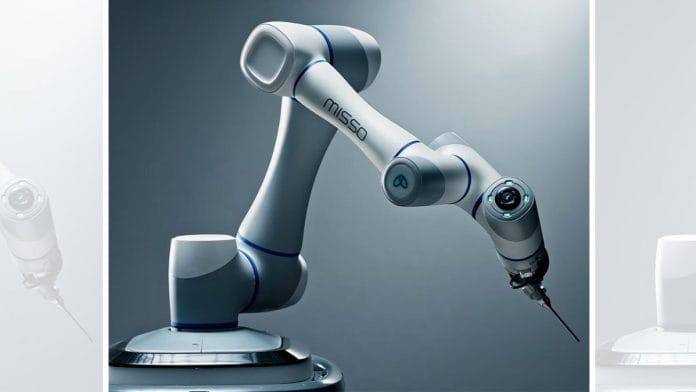New Delhi: A next-generation surgical robot system launched in India this month by a Gujarat-based medical device maker is in the eye of a storm, with a rival firm complaining to the drug regulator that it is “Made in China” but being passed off as India-made.
Gurugram-based indigenous surgical robot maker SS Innovations (SSI), which launched the first India-made surgical robot in 2022, wrote to the Central Drugs Standard Control Organisation (CDSCO) on Wednesday, accusing Gujarat-based Merai Newage of importing a fully manufactured surgical robotic system, KANGDUO 2000, from China.
SS Innovations, in a letter to the CDSCO, a copy of which is with ThePrint, said that the company had merely re-labelled and repackaged it under a different brand name—Mizzo Endo 4000—without any local manufacturing or value addition.
It accused Merai Newage of misrepresenting imported devices as made and designed by an Indian company, directly violating the intent of the ‘Make in India’ initiative. It said the claim may “misguide hospitals, patients, and even government stakeholders”.
SS Innovations also questioned how the regulator issued a manufacturing license for Mizzo Endo 4000, when its maker did not have any production facilities in India.
“I think this kind of white-labelling defeats the whole purpose of Prime Minister Narendra Modi Ji’s initiatives of Make in India and Atmanirbhar Bharat,” Dr Sudhir Srivastava, founder and chief executive of SS Innovations, told ThePrint.
“If somebody does not innovate and essentially takes on another technology, and puts their label on it, without actually working on it, or developing it, it leaves a very bad taste for other authentic Indian companies,” he said.
The charges, according to the surgical device maker, are based on a scrutiny of the robotic system’s import and export data.
The letter, undersigned by the company’s counsel, also states that the development “raises questions on the robustness of the CDSCO licensing framework, if companies are securing manufacturing licenses without any actual production facilities in India for the said model”.
ThePrint reached out to Drug Controller General of India Rajiv Singh Raghuvanshi, who heads the CDSCO, over the phone for his comments. This story will be updated if and when he responds.
Also Read: Paracetamol linked to autism? As Trump warns pregnant women, here’s what science says
‘Surgical robot components sourced globally’
Merai Newage, a subsidiary of Vapi-based medical device maker Meril Life Sciences, denied the allegations. Meril Group CEO Vivek Shah told ThePrint that Mizzo Endo 4000 is an India-manufactured product, fully integrated and validated at its own facility in compliance with Indian regulations.
“Leveraging a global supply chain while building domestic capability is fully aligned to generate employment, and capability within India and across the globe,” he said.
He insisted that “while select high-quality components are sourced globally—as is standard in advanced robotics—the safety architecture, core assembly, software integration, and quality checks are entirely performed in India”.
Merai Newage launched the Mizzo Endo 4000 this month, saying it may redefine surgical precision and accessibility, while marking India’s arrival as a hub for robotic surgery.
The Mizzo Endo 4000 has the same intended use as SSI’s latest robotic system, the Mantra 3, including surgical applications like cardiac surgery, with features like telesurgery, in which surgeons operate remotely. The company required significant clinical validation before obtaining the CDSCO license.
Beyond the robotic platform itself, Meril has also developed a complete ecosystem—training at Meril Academy, clinical support, a robust service network, and seamless integration with surgical portfolio—from sutures and implants to advanced operation theatre solutions.
Shah said that this ensures hospitals and surgeons receive an end-to-end solution that expands access to world-class technology for Indian patients.
He added that while some parts used in the robotic system have been sourced from the US, UK and some Asian countries, including China, the device is “not Made in China”.
Surgical robots are computer-controlled devices that surgeons use to perform procedures, acting as an extension of their own hands and vision.
These devices are being increasingly used across the world, including in India, for higher precision, less pain to patients, lower blood loss and faster recovery. A handful of select multinational and Indian companies are selling these devices.
‘Changing brand name and model name’
SSI urged CDSCO to investigate Merai’s claimed manufacturing facilities for the Mizzo Endo 4000, scrutinise its import records and supply chain, and verify the authenticity of its manufacturing license.
This should be done “in light of the evidence that products are fully imported, requiring an import license with changing the brand name and model name of the imported products”, SSI Innovations said.
It has also demanded that Merai’s manufacturing licensing be suspended or cancelled if it is confirmed that the products are merely imported from China and relabelled and repackaged in India.
Meanwhile, Rajiv Nath, Forum Coordinator of the Association of Indian Medical Device Industry (AiMeD), a network of firms making medical devices indigenously, said that the association often receives complaints about unfair competition on government e-marketplace (GEM) tenders.
Under the current Drugs and Cosmetics Act, even labelling or repackaging is accepted as manufacturing, allowing organisations that rebrand products to get such a license.
“It is unfair to manufacturers making fully local products who have spent huge resources on a green field project to make components, process and assemble them. For this reason, medical devices in the country should be brought under a separate set of regulations,” Nath told ThePrint.
(Edited by Sugita Katyal)
Also Read: Cancer death rates declined globally between 1990 and 2023. India was an exception







It’s a no brainer. Our capability is limited to manufacturing potholes, so surgical robot is made in China hands down.
Yeh Chor(read gurarati) chori se jian,herapheri se nain